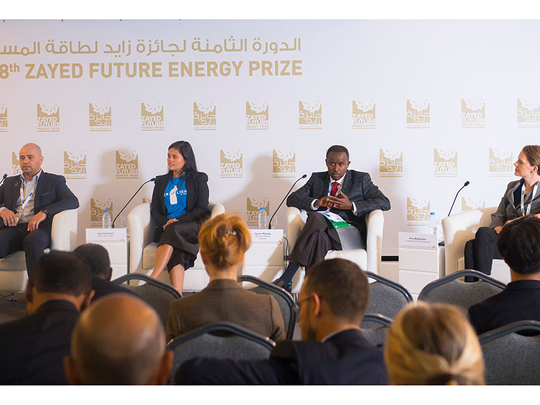
Abu Dhabi: When describing renewables, the term ‘alternative energy’ is not valid any more as this source of power has become mainstream, the audience was informed on the second day of Abu Dhabi Sustainability Week (ADSW) today (Tuesday).
Speaking as a panellist on the topic, ‘Empowering Climate Victims through Energy Innovation’ [in developing countries], No’man Al Adhami, senior director of Business Development at Vestas Middle East, a firm that specialises in providing hydropower solutions to the region, said: “Countries like the Kingdom of Saudi Arabia are ideal for wind power plants due to the high winds the country sees. We are also developing turbines that align with the conditions in countries such as the UAE, which sees less wind speed.”
Another panellist, Caesar Mwangi, CEO of Sunny Money which has already distributed 1.8 million solar energy devices in Africa, said that these technologies have a huge impact on residents of countries which receive them.
Speaking on the benefits of solar energy devices and their lifestyle-altering power, Mwangi said, “We have extended study hours for children by two billion [hours] and averted 2.5 million tonnes of CO2 emissions. Around 50 per cent of newborn babies [globally] who live in poorly ventilated, kerosene- and candle-reliant homes suffer from lung and breathing problems. So, even the health impact of using solar power is huge,” he said.
All experts participating in the panel discussion agreed that coming up with renewable energy solutions is an imperative because waiting until rural and poor areas in developing countries are connected to a power grid is an impractical objective.
Talking of baseline issues that impact children living in societies that do not have access to electricity, Mwangi said, “Every day that passes, school exams get closer and so it’s all about practicality and speed. With a lack of education, poverty [continues] and is inherited from one generation to the next because children are not doing well at school due to the lack of electricity. Studying in candlelight is harmful for the eyes and the smoke is bad for the health.”
Another panellist, Liter of Light CEO Ami Valdemoro, a company that offers low-cost infrastructure solutions to developing countries around the world, highlighted a singularly stark fact of how having access to light and visibility can improve everyday situations and enhance quality of life. Valdemoro highlighted the fact that violence and crime against women in refugee camps — which have received solutions from Liter of Light — has gone down significantly.
He also pointed out that in many areas in the world, though access to a power grid is available, low-income families are not able to sign up for it. In these situations, low-cost energy technologies must be made available, he said.
Al Adhami pointed out that over the past decade, the price of solar energy has decreased by about 80 per cent, and in the past five years, the cost of harnessing wind energy has gone down by about 58 per cent.








